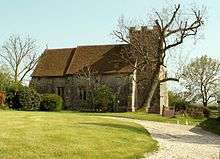Little Wigborough
Little Wigborough is a village in the civil parish of Great and Little Wigborough, in the Colchester borough of Essex, England and forms part of Winstred Hundred Parish Council.[1] Little Wigborough is located between Peldon and Great Wigborough.

The place-name 'Wigborough' is first attested in the Domesday Book of 1086, where it appears as Wicgebergha and Wigheberga. Little Wigborough is first referred to in the Valuation of Norwich of 1254, where it appears as Wigeberwe Parva. The name means 'Wicga's hill or barrow'.[2]
The parish church is dedicated to St Nicholas.[3] It is a Grade II* listed building dating from the 15th century.[4]
History
_-_India_Office_Official_Record_of_the_Great_War_(1921)_-_BL_Photo_21-108.jpg)
In the early hours of 24 September 1916, the German Army Zeppelin L33 was returning from a bombing raid on London, when it hit by an anti-aircraft shell and further damaged by Royal Flying Corps aircraft. It made a forced landing in the village, close to New Hall farm. The crew tried to burn the wreckage but they were only partially successful. They were arrested by the local special constable as they walked away from the scene.[5] A pen drawing with pencil of the Zeppelin by the Scottish artist Adam Bruce Thomson is on display at the Scottish National Portrait Gallery.[6]
References
- http://www.winstred100.org
- Eilert Ekwall, The Concise Oxford Dictionary of English Place-names, p.517.
- http://www.achurchnearyou.com/little-wigborough-st-nicholas/
- Historic England. "CHURCH OF ST NICHOLAS (1223007)". National Heritage List for England. Retrieved 7 June 2014.
- Colchester Metal Detecting Club: Zeppelin L33 Crashes in Lt Wigborough
- National Portrait Gallery - Remembering the Great War Retrieved 1 December 2014